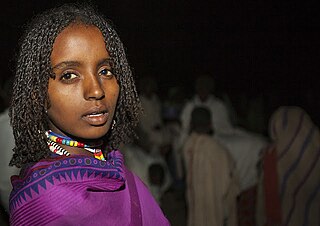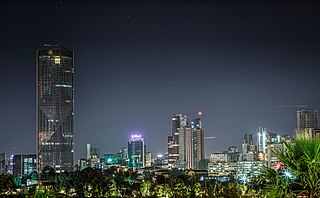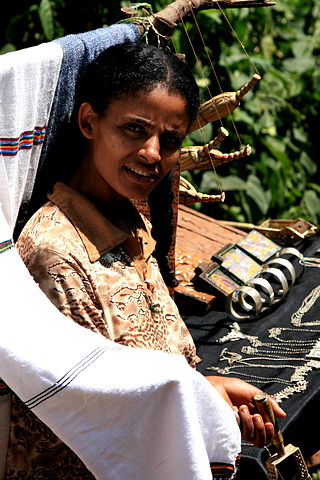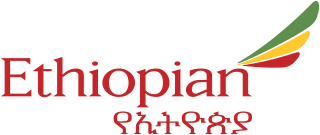
The Oromo people are a Cushitic ethnic group native to the Oromia region of Ethiopia and parts of Northern Kenya. They speak the Oromo language, which is part of the Cushitic branch of the Afroasiatic language family. They are one of the largest ethnic groups in Ethiopia. According to the last Ethiopian census of 2007, the Oromo numbered 25,488,344 people or 34.5% of the Ethiopian population. Recent estimates have the Oromo comprising 45,000,000 people, or 35.8% of the total Ethiopian population estimated at 116,000,000.

Haile Selassie I was the Emperor of Ethiopia from 1930 to 1974. He rose to power as the Regent Plenipotentiary of Ethiopia under Empress Zewditu between 1916 and 1930. Widely considered to be a defining figure in modern Ethiopian history, he is accorded divine importance in Rastafari, a relatively new Abrahamic religion that emerged in the Colony of Jamaica in the 1930s. A few years before he began his reign over the Ethiopian Empire, Selassie defeated Ethiopian army commander Ras Gugsa Welle Bitul, who was the nephew of Empress Taytu Betul, during the Battle of Anchem. He belonged to the Solomonic dynasty, which was founded by Emperor Yekuno Amlak in 1270; Amlak's successors claimed that he was a lineal descendant of Menelik I, the legendary Emperor of Ethiopia who was supposedly born to King Solomon and Queen Makeda of the Kingdom of Israel and the Kingdom of Sheba, respectively. Modern historians regard the Solomonic linage claim as an unfounded myth created by Yekuno Amlak to justify wresting power from the Zagwe Dynasty.

Addis Ababa is the capital and largest city of Ethiopia. In the 2007 census, the city's population was estimated to be 2,739,551 inhabitants. Addis Ababa is a highly developed and important cultural, artistic, financial and administrative center of Ethiopia. It is widely known as one of Africa's major capitals.

The Horn of Africa (HoA), also known as the Somali Peninsula, is a large peninsula and geopolitical region in East Africa. Located on the easternmost part of the African mainland, it is the fourth largest peninsula in the world. It is composed of Somalia, Djibouti, Ethiopia, and Eritrea. Although not common, broader definitions include parts or all of Kenya and Sudan. It has been described as a region of geopolitical and strategic importance, since it is situated along the southern boundary of the Red Sea; extending hundreds of kilometres into the Gulf of Aden, Guardafui Channel, and Indian Ocean, it also shares a maritime border with the Arabian Peninsula.
Amharic is an Ethiopian Semitic language, which is a subgrouping within the Semitic branch of the Afroasiatic languages. It is spoken as a first language by the Amharas, and also serves as a lingua franca for all other populations residing in major cities and towns in Ethiopia.

Ethiopia, officially the Federal Democratic Republic of Ethiopia, is a landlocked country located in the Horn of Africa region of East Africa. It shares borders with Eritrea to the north, Djibouti to the northeast, Somalia to the East, Kenya to the South, South Sudan to the West, and Sudan to the Northwest. Ethiopia covers a land area of 1,112,000 square kilometres. As of 2024, it is home to around 132 million inhabitants, making it the 10th-most populous country in the world, the 2nd-most populous in Africa after Nigeria, and the most populated landlocked country on Earth. The national capital and largest city, Addis Ababa, lies several kilometres west of the East African Rift that splits the country into the African and Somali tectonic plates.

The Ethiopian Orthodox Tewahedo Church is the largest of the Oriental Orthodox Churches. One of the few Christian churches in sub-Saharan Africa originating before European colonization of the continent, the Ethiopian Orthodox Tewahedo Church dates back to the Christianization of the Kingdom of Aksum in 330, and has between 36 million and 51 million adherents in Ethiopia. It is a founding member of the World Council of Churches. The Ethiopian Orthodox Tewahedo Church is in communion with the other Oriental Orthodox churches.

Amharas are a Semitic-speaking ethnic group indigenous to Ethiopia, traditionally inhabiting parts of the northwest Highlands of Ethiopia, particularly inhabiting the Amhara Region. According to the 2007 national census, Amharas numbered 19,867,817 individuals, comprising 26.9% of Ethiopia's population, and they are mostly Oriental Orthodox Christian.

Ethiopian Airlines, formerly Ethiopian Air Lines (EAL), is the flag carrier of Ethiopia, and is wholly owned by the country's government. EAL was founded on 21 December 1945 and commenced operations on 8 April 1946, expanding to international flights in 1951. The firm became a share company in 1965 and changed its name from Ethiopian Air Lines to Ethiopian Airlines.

The Second Italo-Ethiopian War, also referred to as the Second Italo-Abyssinian War, was a war of aggression waged by Italy against Ethiopia, which lasted from October 1935 to February 1937. In Ethiopia it is often referred to simply as the Italian Invasion, , and in Italy as the Ethiopian War. It is seen as an example of the expansionist policy that characterized the Axis powers and the ineffectiveness of the League of Nations before the outbreak of the Second World War.

The emperor of Ethiopia, also known as the Atse, was the hereditary ruler of the Ethiopian Empire, from at least the 13th century until the abolition of the monarchy in 1975. The emperor was the head of state and head of government, with ultimate executive, judicial and legislative power in that country. A National Geographic article from 1965 called Imperial Ethiopia "nominally a constitutional monarchy; in fact it was a benevolent autocracy".

The Beta Israel, or Ethiopian Jews, are an African community of the Jewish diaspora. They coalesced in the Kingdom of Aksum and the Ethiopian Empire, which is currently divided between the Amhara Region and Tigray Region in modern-day Ethiopia. After the founding of the State of Israel in 1948, most of the Beta Israel immigrated to Israel or were evacuated from Africa through several initiatives by the Israeli government.

The Derg, officially the Provisional Military Administrative Council (PMAC), was the military dictatorship that ruled Ethiopia, then including present-day Eritrea, from 1974 to 1987, when the military leadership or junta formally "civilianized" the administration but stayed in power until 1991.
The Ethiopian calendar, or Ge'ez calendar is the official state civil calendar of Ethiopia and serves as an unofficial customary cultural calendar in Eritrea, and among Ethiopians and Eritreans in the diaspora. It is also an ecclesiastical calendar for Ethiopian Christians and Eritrean Christians belonging to the Orthodox Tewahedo Churches, Eastern Catholic Churches, and Eastern Protestant Christian P'ent'ay Churches. The Ethiopian calendar is a solar calendar that has much in common with the Coptic calendar of the Coptic Orthodox Church of Alexandria and Coptic Catholic Church, but like the Julian calendar, it adds a leap day every four years without exception, and begins the year on 11 or 12th of September in the Gregorian calendar. A gap of seven to eight years between the Ethiopian and Gregorian calendars results from an alternative calculation in determining the date of the Annunciation.

The Ethiopia national football team, nicknamed Walia, after the Walia ibex, represents Ethiopia in men's international football and is controlled by the Ethiopian Football Federation, the governing body for football in Ethiopia. The team has been representing Ethiopia in regional, continental, and international competitions since its founding in 1943. The Walias play their home games at Addis Ababa Stadium located in the capital city of Addis Ababa. They are currently ranked 150th in the world according to the FIFA World Rankings and 44th in CAF.

The Ogaden War, also known as the Ethio-Somali War, was a military conflict fought between Somalia and Ethiopia from July 1977 to March 1978 over the sovereignty of Ogaden. Somalia's invasion of the region, precursor to the wider war, met with the Soviet Union's disapproval, leading the superpower to end its support for Somalia to fully support Ethiopia instead.

The Ethiopian Empire, historically known as Abyssinia or simply Ethiopia, was a sovereign state that encompassed the present-day territories of Ethiopia and Eritrea. It existed from the establishment of the Solomonic dynasty by Yekuno Amlak around 1270 until the 1974 coup d'état by the Derg, which ended the reign of the final Emperor, Haile Selassie. In the late 19th century, under Emperor Menelik II, the empire expanded significantly to the south, and in 1952, Eritrea was federated under Selassie's rule. Despite being surrounded by hostile forces throughout much of its history, the empire maintained a kingdom centered on its ancient Christian heritage.

Eritrea, officially the State of Eritrea, is a country in the Horn of Africa region of Eastern Africa, with its capital and largest city at Asmara. It is bordered by Ethiopia in the south, Sudan in the west, and Djibouti in the southeast. The northeastern and eastern parts of Eritrea have an extensive coastline along the Red Sea. The nation has a total area of approximately 117,600 km2 (45,406 sq mi), and includes the Dahlak Archipelago and several of the Hanish Islands.

Abiy Ahmed Ali is an Ethiopian politician who is the current Prime Minister of Ethiopia since 2018 and the leader of the Prosperity Party since 2019. He was awarded the 2019 Nobel Peace Prize "for his efforts to achieve peace and international cooperation, and in particular for his decisive initiative to resolve the border conflict with neighbouring Eritrea". Abiy served as the third chairman of the Ethiopian People's Revolutionary Democratic Front (EPRDF) that governed Ethiopia for 28 years and the first person of Oromo descent to hold that position. Abiy is a member of the Ethiopian parliament, and was a member of the Oromo Democratic Party (ODP), one of the then four coalition parties of the EPRDF, until its rule ceased in 2019 and he formed his own party, the Prosperity Party.

The Tigray war was an armed conflict that lasted from 3 November 2020 to 3 November 2022. It was a civil war that was primarily fought in the Tigray Region of Ethiopia between forces allied to the Ethiopian federal government and Eritrea on one side, and the Tigray People's Liberation Front (TPLF) on the other.



















